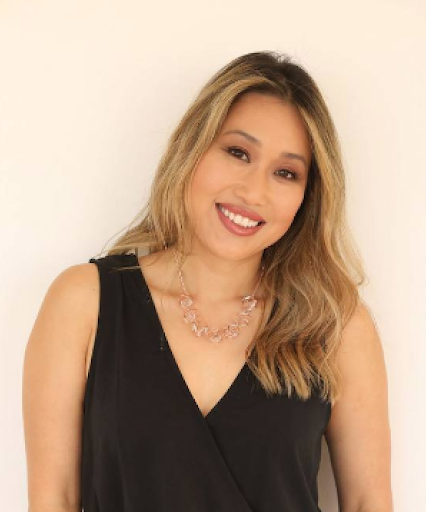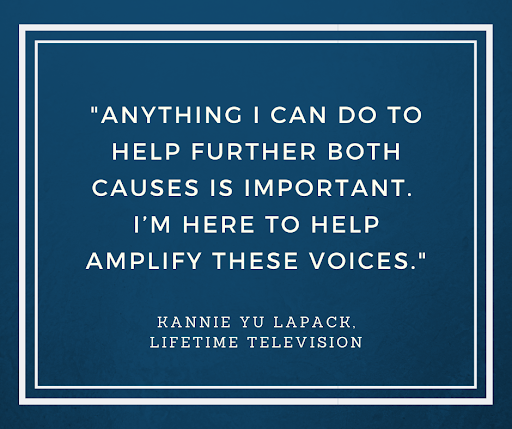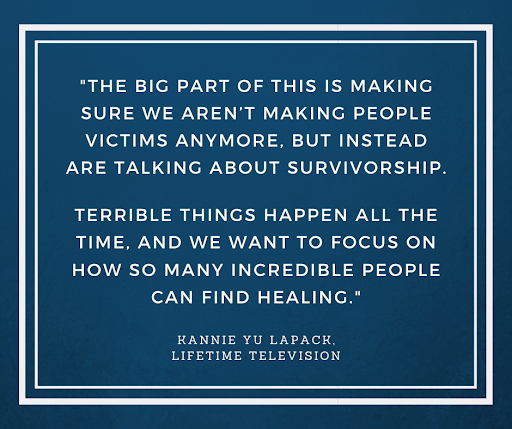 Each month, RAINN highlights a member of its National Leadership Council. The NLC is a group of dedicated individuals who have shown their commitment to RAINN’s mission of supporting survivors and ending sexual violence.
Each month, RAINN highlights a member of its National Leadership Council. The NLC is a group of dedicated individuals who have shown their commitment to RAINN’s mission of supporting survivors and ending sexual violence.
This month, RAINN’s Christy Rozek checked in with Kannie Yu LaPack, who serves as senior vice president of Publicity, Public Affairs and Social Media Strategy at Lifetime Television.
Lifetime and RAINN have previously partnered on Surviving Jeffrey Epstein and the two-part Surviving R. Kelly documentary. When Surviving Jeffrey Epstein aired along with a RAINN PSA, there was a 34% increase in people reaching out to RAINN’s National Sexual Assault Hotline.
This interview has been condensed and edited for clarity.
Why is it important for folks in the entertainment industry to work on issues such as sexual violence?

One of the reasons I wanted to work at Lifetime was because, in addition to entertaining people, the network also seeks to help people and provide valuable information as part of its programming DNA.
When we aired Surviving R. Kelly, we knew that it was our responsibility to provide resources to those watching it. Of course, each person’s experience is different, but for a lot of people, including survivors, it can be really difficult and triggering to watch this subject matter. It would be irresponsible to put this out there without providing a place to turn for those who need to talk or get help.
It’s incredible and so rewarding to see the jump in numbers of people reaching out for help to the RAINN hotline when we air something and include the hotline number. We know we’re truly reaching people.
What inspired you to become part of RAINN’s National Leadership Council?
At Lifetime, we have so many projects that affect women, and sexual violence is one of them—though of course it affects people of any gender. It was an honor for me to be asked to join. Anything I can do to help further both causes is important. I’m here to help amplify these voices.

What do we need to do as a country to prevent sexual violence?
There’s so much that needs to be done. A huge part of it is education. We need to start educating kids at lower grade levels about what’s right and wrong, what they can share, which parts of their bodies are private.
Kids need to know that it’s not okay if someone tells them not to tell anyone else what happened, that they should still tell their parents. There shouldn’t be any shame. Sadly, for many kids, their family isn’t a safe place to get help, so they need to know that there are other people to tell and other resources out there.
Do you feel special motivation about this issue as a parent?
My daughter is 5. I always tell her that she should tell my husband and I if anything strange happens, even if someone tells her not to tell us.
There’s so much going on online. I’m always asking about what my daughter and son are seeing online. Parents have to be vigilant. Kids need to feel that they have a safe space to share. It’s just about checking in with them every day and educating them in a way that’s not scary or overwhelming.
How can we all be better supporters and advocates for survivors in our lives?
Everyone is so different in what kind of support they need. But I’d say be there and check in with them. Even if it just means a supportive text to remind them you are thinking about them.
What do you try to keep in mind while telling survivors’ stories in Lifetime programming?
Every time we look at a project, we try to hone in on what message it will send. The big part of this is making sure we aren’t making people victims anymore, but instead are talking about survivorship. Terrible things happen all the time, and we want to focus on how so many incredible people can find healing.
What is your message to survivors?
This is a hard one for me because I’m not personally a survivor of sexual violence and don’t know if I can properly give a takeaway message.
But, I am a recent breast cancer survivor—a different kind of trauma to heal from—and I can tell you what helped me. Being open about my diagnosis and treatment. I shared what I was going through with everyone in my life and they were so extremely supportive. I was shocked how many people came to lend their words, hugs, and smiles. It made my journey so much easier. Having support helps you get through those dark times, but had I not shared, I would have been battling in silence.
Take it day by day. Ask for help even when you don’t think you need it. Accept the help that is provided around you. That’s the first step. Everyone’s a work in progress.
I don’t know if people realize how strong they really are. You can really get through everything, even if you don’t think you can.